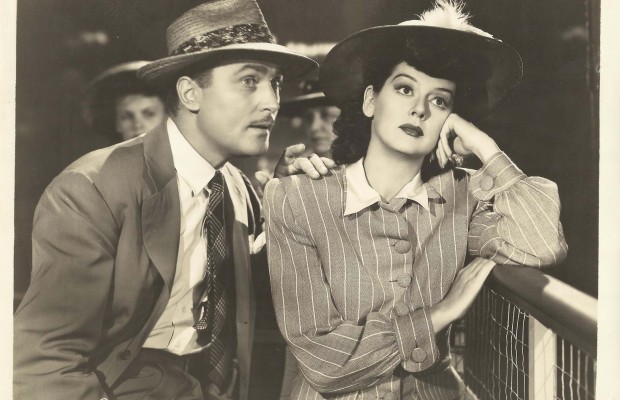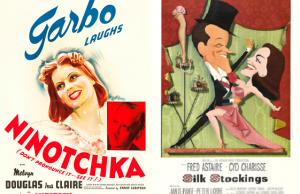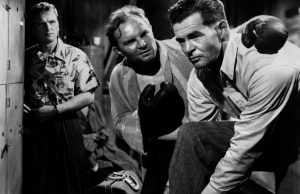My Sister Eileen (1942)

Toronto Film Society presented My Sister Eileen (1942) on Monday, August 24, 2015 in a double bill with I Can Get It For You Wholesale as part of the Season 68 Monday Summer Series, Programme 7.
Production and release: Columbia Pictures. Producer: Max Gordon. Director: Alexander Hall. Screenplay: Joseph Fields and Jerome Chodorov. Basedon the play “My Sister Eileen” by Joseph Fields and Jerome Chodorov (New York, 26 Dec. 1940), as produced by Max Gordon, which was adapted from The New Yorker stores by Ruth Mckenney. Photography: Joseph Walker. Film Editor: Viola Lawrence. Art Directors: Lionel Banks and Cary Odell. Set Decorations: Fay Babcokc. Music Director: Morris W. Stoloff.
Cast: Rosalind Russell (Ruth Sherwood), Brian Aherne (Robert Baker), Janet Blair (Eileen Sherwood), George Tobias (Appopolous), Allyn Joslyn (Chic Clark), Grant Mitchell (Walter Sherwood), Gordon Jones (“The Wreck” Loomis), Elizabeth Patterson (Grandma Sherwood), Richard Quine (Frank Lippincott), June Havoc (Effie Shelton), Donald MacBride (Officer Lonigan), Fran Sully (Jensen), Clyde Fillmore (Ralph Craven), Jeff Donnell (Helen Loomis).
In 1942, Columbia released the first film version of My Sister Eileen. Based on the madcap adventures of the McKenney sisters, penned by aspiring authoress Ruth and published in the New Yorker, the stories enjoyoed immediate popularity when written as a Broadway play in 1940. During its three-year run, theatergoers flocked to the crowd-pleaser, touted by critics as “the giddiest delight to be seen hereabouts since You Can’t Take It With You. The studio–in an unusual move for its time–adapted the play to the screen during the stage run, meaning that audiences could either see Shirley Booth (best known as TV’s Hazel) live, or Rosalind Russell on the screen playing Ruth, the cynical and sensible sister trying to break into journalism. Man-magnet and hopeful actress Eileen provides the fodder for most of the misadventures, but even their living situation is comical: a basement apartment in Greenwich Village directly over a subway construction site, replete with wacky neighbors.
Russell shot to stardom playing another journalist in Howard Hawks’ His Girl Friday (1940) co-starring with Cary Grant. As Hildy Johnson, she pioneered the role of the smart and sassy career woman; her expert portrayal of an independent spirit led film analyst Marjorie Rosen to conclude, “Never for a moment does an audience doubt that she can’t manage all by herself.” Indeed, Russell was very comfortable being charge in front of the camera; in her autobiography ” Life Is a Banquet, published shortly after her death in 1976, she describes the relationship between her and co-star: “Janet Blair, the girl who was cast as Eileen, started trying to upstage me. She was new and nervous, the same way I’d been when I started, so I invited her to my dressing room and delivered a short speech about the inadvisability of the course she’d embarked on. ‘Look,’ I said, ‘you’re not going to get any place with what you’re doing. I know all those old tricks. When you upstage me, all I do is turn my back on the camera, and then they have to come around on me full-face for my close-up.'” When the seasoned pro offered to then instruct her on how to deliver an effective performance, an astonished Blair thanked her profusely for her kindness, to which the brassy Russell responded, “I’m not doing it because I like you, I don’t know anything about you. I’m doing it to get a good picture.” Direct and to the point: very fitting for a woman who once declared, “Acting is standing up naked and turning around very slowly.”
Russell earned her first Oscar nomination in the Best Actress category for her role in My Sister Eileen. Of the nomination she commented, “Glad as I was about it, the honor put me under heavy pressure. It means too much to the studio to have their people win; I still can’t think about the tension surrounding these races without breaking into a sweat.” She didn’t have to sweat for long, she lost to Greer Garson for Mrs. Miniver (1942), the sentimental favourite that year. It would be the first of four nominations for Roz.
On a tragic note, the real Eileen McKenney died only four days before the Broadway opening. She was in a deadly car accident that also claimed the life of her husband, screenwriter and novelist Nathanel West, who is best known for his 1939 novel The Day of the Locust and later the 1975 film adaptation. Her memory, however, was kept alive through not only the play and the 1942 film: Russell starred in a musical version of My Sister Eileen rechristened Wonderful Town that opened on Broadway in 1953 and earned the actress a Tony award for her performance. In 1955, another version of My Sister Eileen was scripted and filmed, this time starring Janet Leigh, Jack Lemmon and Bob Fosse. There was even a short-lived television series starring Broadway legend Elaine Stritch. But only the 1942 version has a surprise guest appearance in its final scene. Here’s a hint: they were the kings of Columbia comedy shorts–nyuk, nyuk, nyuk!
Notes by Peter Poles












[…] My Sister Eileen (1942), a film I had seen and remembered quite enjoying when I had seen it at a TFS screening back in August 2015. Directed by Alexander Hall, it’s the story of two sisters, […]